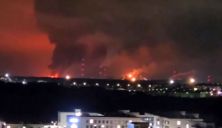In Kazakhstan, goods with the military symbols of the Russian occupiers, namely the Latin letters Z and V, the inscriptions “Army of Russia”, “Polite people”, as well as paraphernalia of the private military company “Wagner”, may be banned. When the ban is legalized, violators are planned to be fined, FREEDOM reports.
“In the current year, the Prosecutor General’s Office of the Republic of Kazakhstan (Republic of Kazakhstan) sent a proposal to the Government of the Republic of Kazakhstan on a legislative ban and establishment of administrative responsibility for the manufacture, storage, importation, transportation and distribution on the territory of the country of paraphernalia, symbols, and signs used by the parties opposing in armed conflicts , in military or other violent actions against the sovereignty and political regime of another state,” said Semey Kuat Bapi, the prosecutor of the public interest protection department of the prosecutor’s office.
In order for the ban to work, and its violators to bear responsibility, it is necessary to introduce appropriate legislative changes. Experts believe that the speed of legal processes depends on the political will of the republic’s leadership.
“The proposal has been sent to the government of Kazakhstan. In the future, after consideration by the government, it should go to the Parliament of Kazakhstan, and then to the signature of the President of the Republic, Kasym-Zhomart Tokayev. That is, until all these procedures are completed, all these proposals remain proposals for the time being and do not have any legal basis,” explained Aidos Sadikov, head of the BASE opposition internet media.
While the taboo on the symbols of the occupiers has not been legalized, entrepreneurs are being prepared for the innovation, and explanatory conversations are held with them.
“Prior to the adoption of the relevant amendments, with the aim of preventing entrepreneurs from being held administratively liable… they conducted explanatory work on preventing the distribution of ethno-politicized symbols through trade networks,” the message of the National Chamber of Entrepreneurs of the Republic of Kazakhstan “Atameken” reads.
After almost a year and a half of Russia’s full-scale war against Ukraine, the authorities of Kazakhstan continue to cover themselves with neutrality, while simultaneously trading with the aggressor country and helping it circumvent Western sanctions. Because of this, Astana was under threat of secondary economic restrictions. Therefore, the upcoming ban on Russian symbols is not only a step to ensure national security, but also, presumably, an attempt to restore the country’s positive image.
“This is, of course, aimed at external consumption, at the fact that Western countries, primarily the Americans, the British, the French, will notice that there is some movement in Kazakhstan in this direction, in the direction of confrontation with Russia, the banning of its symbols. In this way, they want to slightly level the situation, which is currently developing, because the Americans and Western Europeans are planning to impose sanctions against Kazakhstan, Kyrgyzstan and other countries of Central Asia for helping Russia to circumvent the sanctions,” said Aidos Sadikov.
In addition to Ukraine, the demonstration of unofficial symbols of the Russian occupation army was completely banned or restricted in Lithuania, Latvia, Estonia, Poland, Moldova, as well as in Germany. Kazakhstan may become the first Asian country in which such a taboo will work.













